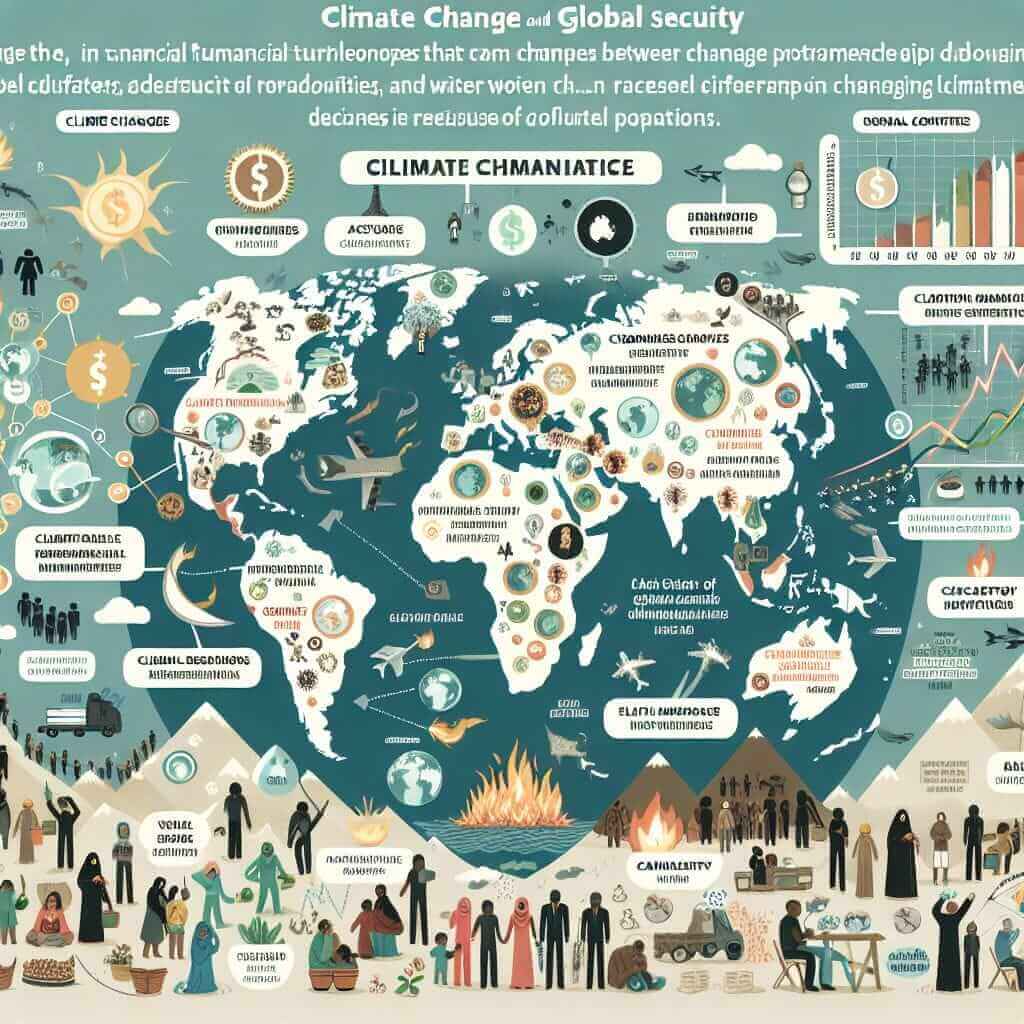In recent years, climate change has become an increasingly significant issue within global security frameworks. The effects range from environmental disruptions to economic and social instability, posing substantial risks to global peace and security. Given its relevance, the topic “How does climate change impact global security?” has appeared frequently in IELTS Reading exams. Understanding this topic can not only help increase your Reading score but also prepare you meaningfully for a potentially pivotal issue of our times.

Main Content
Reading Passage
Below you will find an IELTS-style reading text that focuses on the topic “How does climate change impact global security?” This is designed to mimic a Medium Text passage for practice.
Text:
Climate change is no longer a distant threat but an imminent reality, affecting various aspects of global security. The increasing frequency and intensity of natural disasters, such as hurricanes, droughts, and floods, disrupt infrastructure, displace populations, and strain resources. These environmental changes exacerbate socio-economic inequalities, creating conducive conditions for conflicts and terrorism.
One significant area where climate change affects global security is through its impact on food and water resources. As agricultural patterns shift due to fluctuating temperatures and unpredictable weather, food production becomes less reliable, leading to shortages and higher prices. This can trigger political instability and mass migrations, putting pressure on neighboring countries and leading to border tensions.
Moreover, rising sea levels threaten coastal and island nations, necessitating large-scale relocations and potentially rendering some areas uninhabitable. This displacement exacerbates the refugee crisis, often leading to conflicts over resources in the receiving regions. Additionally, the degradation of arable land and freshwater resources can lead to ‘water wars’ in arid regions where water is already scarce.
Climate-induced migration also poses substantial risks. When people move in large numbers, whether due to sea-level rise, extreme weather, or resource scarcity, these migrations often result in heightened competition for resources, cultural clashes, and increased vulnerability to exploitation and violence. Fragile states and regions are particularly susceptible to these pressures, which can further destabilize already tense situations.
Lastly, climate change impacts military readiness and effectiveness. Bases and facilities located in vulnerable areas may suffer from natural disasters, while humanitarian missions may increase, diverting resources from traditional defense roles. These factors cumulatively contribute to a global landscape where peace and security are profoundly influenced by environmental conditions.
Questions
-
Multiple Choice Question:
What is one of the primary reasons climate change poses a threat to global security?
a) Declining literacy rates
b) Changes in weather impacting food production
c) Decreased oil reserves
d) Increased technological advancements -
True/False/Not Given:
The primary cause of climate-induced conflicts is the reduction in literacy rates. [False] -
Matching Headings:
Match the following sections with their correct headings:- The relationship between climate change and food security.
- The impact of climate change on migration and military readiness.
-
Short-answer Questions:
What are two natural disasters mentioned in the passage that are intensified by climate change?
Answer Key
-
Multiple Choice Answer:
b) Changes in weather impacting food production
Explanation: The passage notes that shifting agricultural patterns due to climate change lead to food shortages and political instability, affecting global security. -
True/False/Not Given Answer:
False
Explanation: The passage does not mention declining literacy rates as a cause for climate-induced conflicts but focuses on food, water, and migration issues. -
Matching Headings Answer:
- The relationship between climate change and food security.
- The impact of climate change on migration and military readiness.
Explanation: These headings summarize the sections discussing food and water scarcity issues and their broader implications on migration and military effectiveness.
-
Short-answer Questions Answer:
Hurricanes and droughts
Explanation: These disasters are mentioned as increasing in frequency and intensity due to climate change, leading to infrastructure disruption and displacement.
Common Mistakes to Avoid
- Misinterpreting the question: Always read each question carefully and look for keywords that directly match information in the text.
- Skipping words or phrases: Pay close attention to each word in the text and question to avoid missing critical information.
- Not managing time efficiently: Practice reading quickly but effectively to improve time management during the real exam.
Vocabulary to Know
- Displace (verb) /dɪˈspleɪs/: to force people to move from their usual place of residence.
- Arable (adjective) /ˈær.ə.bl̩/: capable of being farmed productively.
- Exacerbate (verb) /ɪɡˈzæs.ə.beɪt/: to make a problem, bad situation, or negative feeling worse.
Key Grammar Points
-
Relative Clauses:
- Definition: Clauses that provide additional information about a noun.
- Example: “Bases and facilities located in vulnerable areas may suffer from natural disasters.”
- Usage: Provide more detail about “Bases and facilities.”
-
Conditional Sentences:
- Definition: Sentences expressing one thing contingent on another.
- Example: “If agricultural patterns shift due to fluctuating temperatures, food production becomes less reliable.”
- Usage: Describes the conditional relationship between two events.
Tips for Achieving a High Score in IELTS Reading
- Practice Regularly: Consistent practice using reading passages similar to IELTS will improve both speed and comprehension.
- Expand Vocabulary: Broadening your vocabulary helps in understanding a variety of texts better.
- Develop Skimming and Scanning Techniques: Learn to quickly identify main ideas and specific information in a text.
- Time Management: Allocate specific times to each section to ensure you complete the reading within the given timeframe.
With these strategies and consistent practice, you can confidently tackle the IELTS Reading section and improve your band score. Good luck!